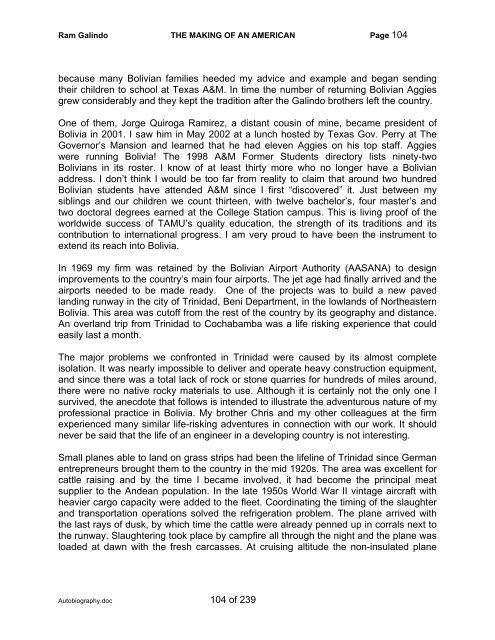Autobiography - The Galindo Group
Autobiography - The Galindo Group
Autobiography - The Galindo Group
Create successful ePaper yourself
Turn your PDF publications into a flip-book with our unique Google optimized e-Paper software.
Ram <strong>Galindo</strong> THE MAKING OF AN AMERICAN Page 104<br />
because many Bolivian families heeded my advice and example and began sending<br />
their children to school at Texas A&M. In time the number of returning Bolivian Aggies<br />
grew considerably and they kept the tradition after the <strong>Galindo</strong> brothers left the country.<br />
One of them, Jorge Quiroga Ramirez, a distant cousin of mine, became president of<br />
Bolivia in 2001. I saw him in May 2002 at a lunch hosted by Texas Gov. Perry at <strong>The</strong><br />
Governor’s Mansion and learned that he had eleven Aggies on his top staff. Aggies<br />
were running Bolivia! <strong>The</strong> 1998 A&M Former Students directory lists ninety-two<br />
Bolivians in its roster. I know of at least thirty more who no longer have a Bolivian<br />
address. I don’t think I would be too far from reality to claim that around two hundred<br />
Bolivian students have attended A&M since I first “discovered” it. Just between my<br />
siblings and our children we count thirteen, with twelve bachelor’s, four master’s and<br />
two doctoral degrees earned at the College Station campus. This is living proof of the<br />
worldwide success of TAMU’s quality education, the strength of its traditions and its<br />
contribution to international progress. I am very proud to have been the instrument to<br />
extend its reach into Bolivia.<br />
In 1969 my firm was retained by the Bolivian Airport Authority (AASANA) to design<br />
improvements to the country’s main four airports. <strong>The</strong> jet age had finally arrived and the<br />
airports needed to be made ready. One of the projects was to build a new paved<br />
landing runway in the city of Trinidad, Beni Department, in the lowlands of Northeastern<br />
Bolivia. This area was cutoff from the rest of the country by its geography and distance.<br />
An overland trip from Trinidad to Cochabamba was a life risking experience that could<br />
easily last a month.<br />
<strong>The</strong> major problems we confronted in Trinidad were caused by its almost complete<br />
isolation. It was nearly impossible to deliver and operate heavy construction equipment,<br />
and since there was a total lack of rock or stone quarries for hundreds of miles around,<br />
there were no native rocky materials to use. Although it is certainly not the only one I<br />
survived, the anecdote that follows is intended to illustrate the adventurous nature of my<br />
professional practice in Bolivia. My brother Chris and my other colleagues at the firm<br />
experienced many similar life-risking adventures in connection with our work. It should<br />
never be said that the life of an engineer in a developing country is not interesting.<br />
Small planes able to land on grass strips had been the lifeline of Trinidad since German<br />
entrepreneurs brought them to the country in the mid 1920s. <strong>The</strong> area was excellent for<br />
cattle raising and by the time I became involved, it had become the principal meat<br />
supplier to the Andean population. In the late 1950s World War II vintage aircraft with<br />
heavier cargo capacity were added to the fleet. Coordinating the timing of the slaughter<br />
and transportation operations solved the refrigeration problem. <strong>The</strong> plane arrived with<br />
the last rays of dusk, by which time the cattle were already penned up in corrals next to<br />
the runway. Slaughtering took place by campfire all through the night and the plane was<br />
loaded at dawn with the fresh carcasses. At cruising altitude the non-insulated plane<br />
<strong>Autobiography</strong>.doc 104 of 239


